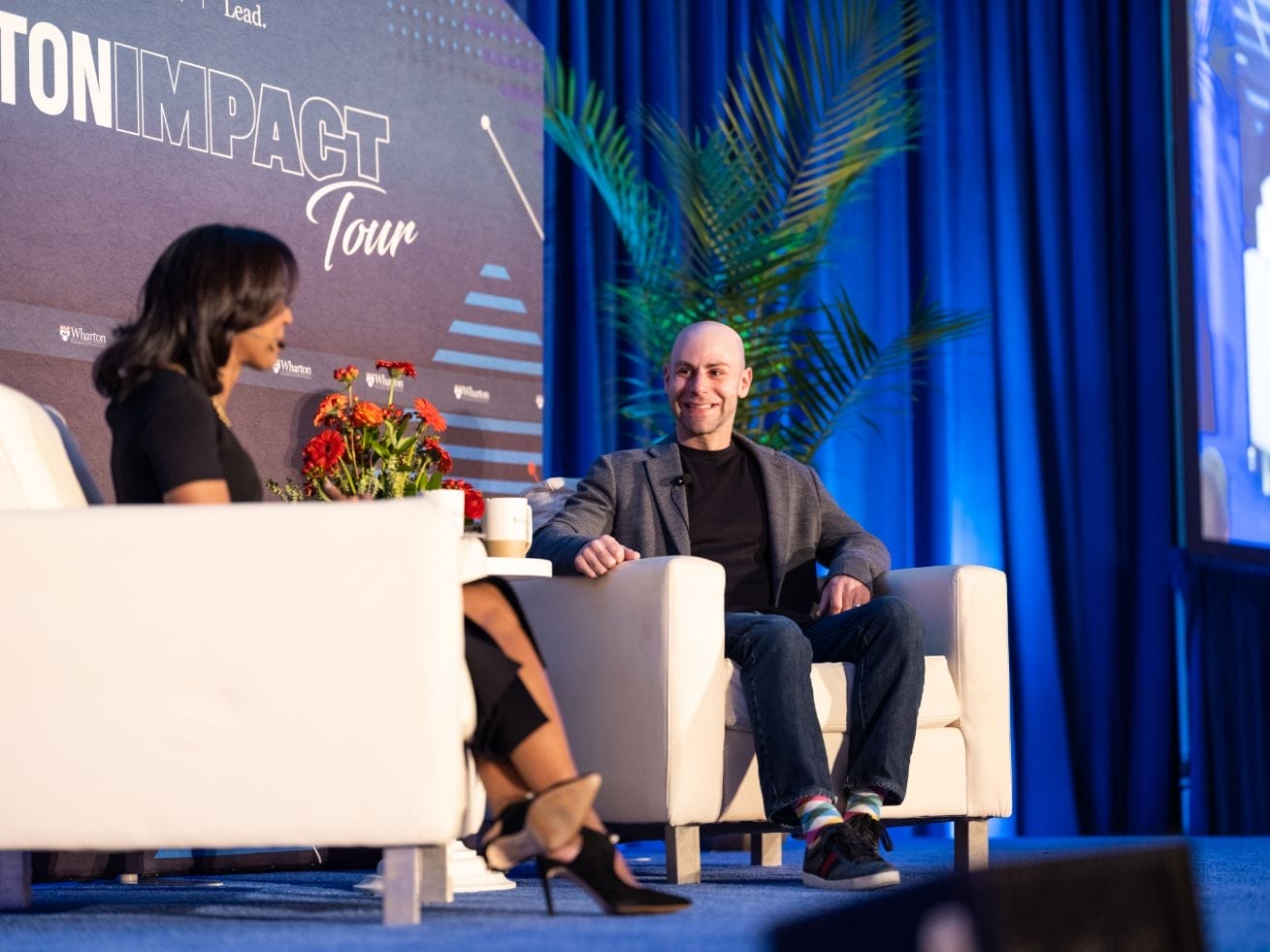It was a paralyzing moment atop a diving board in high school that led to one of Wharton management professor Adam Grant’s most formative moments. The young athlete had been brought to a standstill above the water by the thought of practicing a daring new dive, one requiring multiple flips and a twist. The minutes ticked by as he sought the bravery to spring to action. An onlooker to Grant’s indecision, his endlessly patient coach, Eric Best, finally interjected: “Are you going to do this one day?” Grant said he would.
“Then what,” Best asked, “are you waiting for?”
Speaking in May to a packed crowd at the Loews Philadelphia Hotel in Center City, Grant said he has replayed that exchange in his mind every time he has felt fear in his work. “When I was afraid to write my first book, I heard Eric’s voice,” said the organizational psychologist, who has since published multiple New York Times bestselling works, including his latest, Think Again: The Power of Knowing What You Don’t Know. “When I was afraid to get out on the TED stage … I heard Eric’s voice.”
Grant relayed the anecdote during an evening conversation with Wharton Dean Erika James in which the two academic leaders covered everything from improving team dynamics to leading amid crisis. The event was the latest stop on the Wharton Impact Tour, a series bringing insights from across academia, industry, and government to Wharton alumni around the globe.

Dean James offers opening remarks.
On the topic of team dynamics, Grant proposed writing one’s own “user manual” to help colleagues understand their personal working style and idiosyncrasies. “Give it to your new hires and tell them, ‘Here’s how to work with me effectively, here’s what brings out the best in me, the worst in me, my pet peeves, [and] here’s what my favorite collaborators have done,’” said Grant. Going a step further, he recommended asking co-workers for input on the guide to capture personal blind spots. The manual, said Grant, helps other employees “anticipate what’s going to be tricky about working with me and how to do it more effectively.”
Discussing the employment landscape today, both Grant and James agreed that, despite the bad rap young workers often get, they’re just as high-achieving as employees of earlier generations. “My experience,” said James, “is that they’re very willing to work as long as they feel inspired by the work.” Extending that thought to employees of any age, Grant said: “We’re all willing to do great work if we believe in the mission of our organization and we can see a line of sight between our jobs and that mission.”
As for leading in times of crisis, James — who co-authored The Prepared Leader: Emerge From Any Crisis More Resilient Than Before — urged leaders not to withdraw amid uncertainty. “It’s human nature to want to retreat in times of crisis and threat,” she said, noting that leaders should instead try to think innovatively while problem-solving in such moments, to tap more people for ideas, and to take risks. “You might even say,” added Grant, “that never taking a risk is a risky decision.”

Dean James addresses a packed alumni audience in Philadelphia.
Before and after the discussion, attendees were treated to networking receptions with light fare. For many guests, the event was an opportunity to get up close with Grant. “A lot of our time in school was online, so it was good to get into a crowd and see Adam in person,” said Xiufang Zhao GAR14 WG22, who attended Wharton at the height of the pandemic.
The evening was also an opportunity to hear directly from James about the School’s future. “It felt like such a breath of fresh air when she was appointed as dean,” said Maria Redin WG08. “I wanted to see her and hear her thoughts for Wharton.” Added Bruce Hauptfuhrer WG94: “She has a strong perspective for preparing the student body.”
In addition, the event offered a chance for alumni across graduating years to connect. Such occasions “make a big difference to the Wharton community,” said Peter Kraynak WG92. “We’ve met so many friends through friends because of cross-year events.”
For others, it was a chance to hear about Wharton’s ongoing role in helping students accomplish their goals beyond graduation. “Early in my career, the Wharton brand was incredibly meaningful to my success,” said Timothy Harrod WG88. “Everything else ripples through after that.”

























